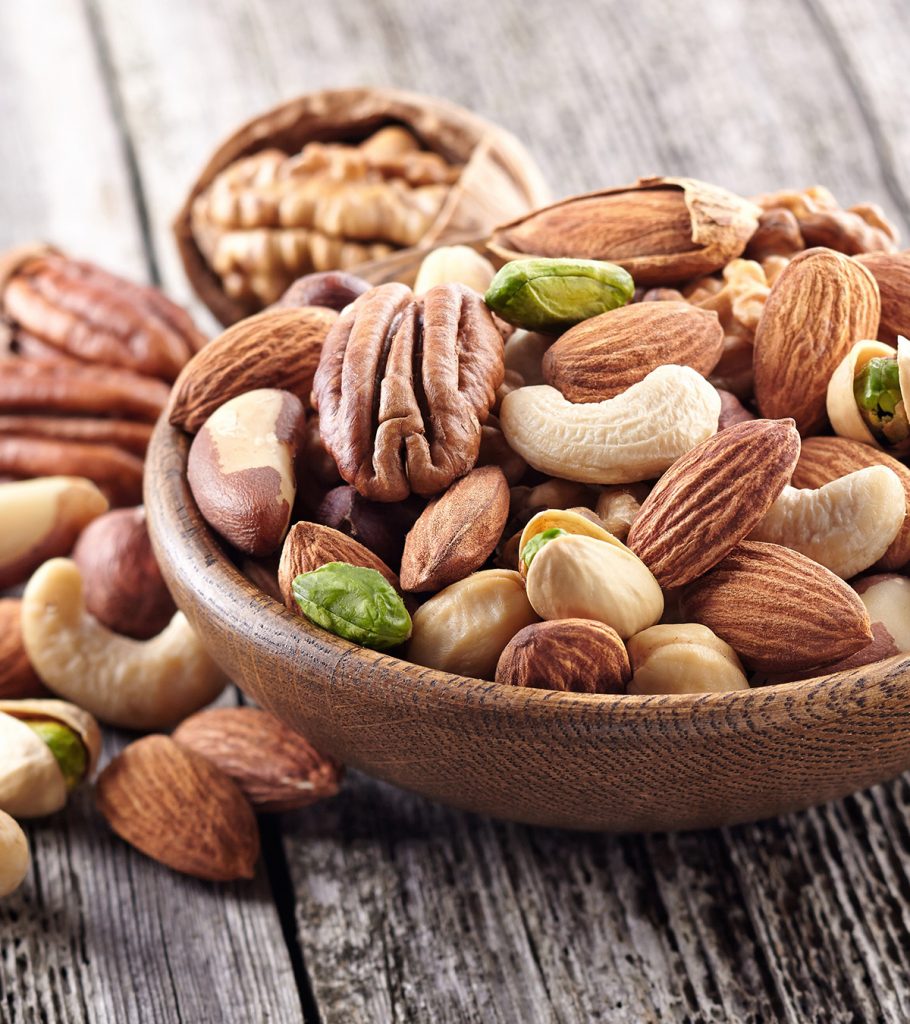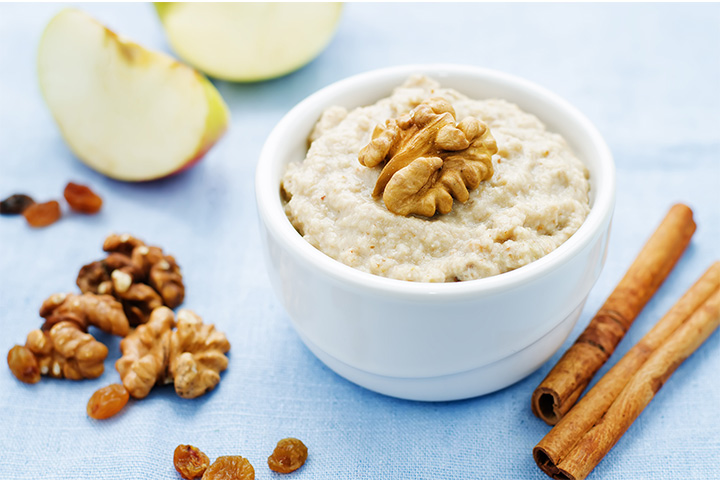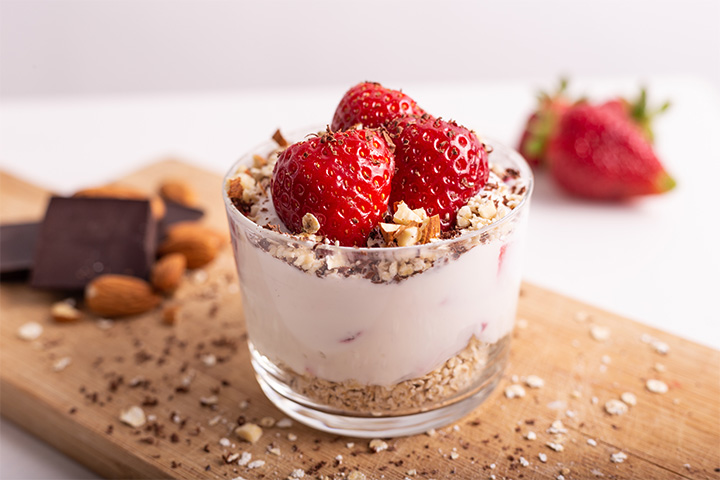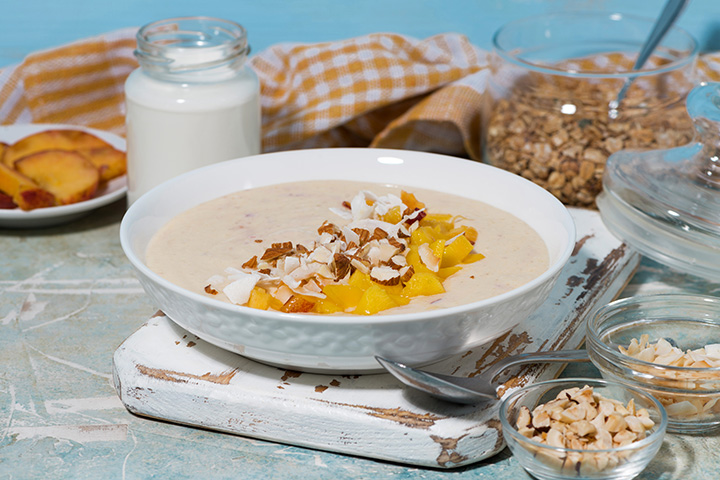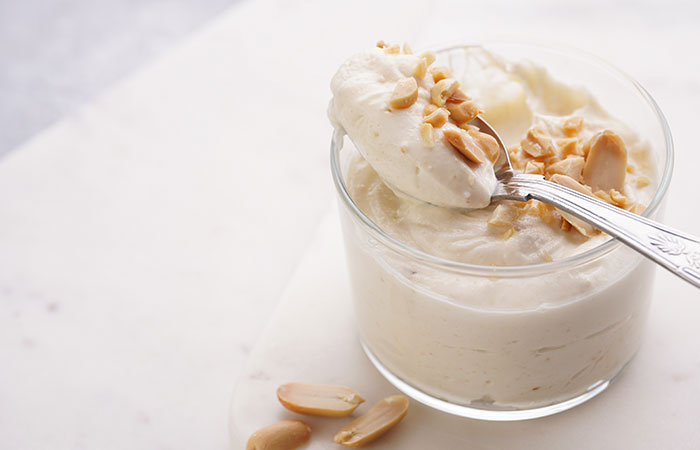Once your baby shifts to solid food, you could be thinking about including nuts in their diet. Nuts for babies can benefit their overall health by offering several essential nutrients and healthy fats. Besides, adding a few nuts to a preparation could enhance its texture and flavor.
Nuts are one of the best-known natural food items that most people consume to boost their health and immunity. But, being a potential allergen, you may have a few safety concerns about giving nuts to your baby.
Explore the health benefits and side effects of nuts for babies, along with the right age and ways to introduce nuts to your little one.
Is It Safe To Feed Nuts To Babies?
Nuts may usually be safe for babies when fed in age-appropriate ways. However, considering their allergenic nature, experts advise consulting a pediatrician before introducing nuts in baby food recipes. It is preeminent if the baby has other food allergies or has a family history of allergies (1). Some of the nuts you may give to babies are cashews, walnuts, almonds, hazelnut, pistachio, pecans, and peanuts.
When Should You Introduce Nuts To Babies?
In contrast to their previous recommendation, the American Academy of Pediatrics (AAP) recommends introducing potentially allergenic foods to babies between four and six months of age (2). According to experts, early introduction of possibly allergenic foods may help prevent food allergies (3). If you are unsure about feeding nuts to your babies from an early age, discuss your doubts with your healthcare provider.
Age-appropriate Ways To Introduce Nuts To Babies
Once you get the pediatrician’s approval, introduce nuts in age-appropriate ways. For young babies who have just started eating solids, choose feeding nuts as nut powder added to breast milk or formula or nuts flour used to make cakes or pancakes.
Alternatively, you can feed nut puffs dissolved in different liquid foods, such as puree or breast milk. Once the baby adjusts to the nut’s taste and digestibility, you can feed them nut snacks like smooth nut butter spread over a bread slice or cracker. Avoid feeding nut butter globs, chopped nuts, and chunky nut butter since they are potential choking hazards (4).
Nutritional Benefits Of Nuts For Babies
Nuts contain nutrients that can facilitate the infant’s nutrition, growth, development, and sustenance. Here are some benefits of adding different types of nuts to your baby’s diet.
1. Nuts are energy-dense foods. One-fourth cup of almonds offers about 208kcal, while cashew and walnuts give 182kcal and 166kcal of energy, respectively (5). Optimum energy intake is essential to meet the rapid development needs of babies and toddlers.
2. Nuts contain vital nutrients. Almonds, walnuts, and cashew contain healthy fats and nutrients, such as vitamin E, calcium, iron, zinc, magnesium, and folateiXNaturally occurring form of vitamin B9, responsible for protein metabolism and the production of red blood cells. These could support a baby’s physiological functions, such as brain and eye development, nerve transmission, and enzyme function (6) (7).
3. Nuts offer healthy plant protein and fiber. Optimum nut protein intake is essential for the baby’s growth, hormone production, enzyme function, and cellular repair. Similarly, dietary fiber consumption is vital for healthy bowel movement and robust gut health. Research has shown that good gut health is essential for an effective immune system (8).
4. Nuts have bioactive compounds such as carotenoidsiXColored pigments found in plant-based foods that act as a precursor in the synthesis of vitamin A and protect cells from damage, polyphenolsiXNaturally occurring antioxidant compounds found in food items such as fruits, vegetables, coffee, tea, and wine, flavonoids, and phenolic compoundsiXBioactive molecules found in plants that are known to have several health benefits. These phytochemicals possess antioxidant effects, which may improve one’s long-term health. Resveratrol is one such compound in pistachio that may hold immunomodulatory propertiesiXThe ability of a substance to boost or inhibit the function of the immune system (9) (10). Besides, some nuts contain phytosterols that lower cholesterol and maintain heart health (11).
Precautions To Take While Feeding Nuts To Babies
Below are some necessary precautions to ensure nuts’ safe consumption in babies.
1. Introduce nuts in age-appropriate ways in small amounts, such as one-fourth of a teaspoon to half a teaspoon, mixed in other foods that the baby consumes already.
2. Maintain a “three-day wait” rule when introducing nuts to babies. Ensure you feed no new food during this period.
3. Keep a close watch on signs and symptoms of discomfort or allergic reaction. If the baby looks uncomfortable after ingesting nuts, discontinue feeding immediately. After a week or more, reintroduce nuts to the baby’s diet. If the discomfort reappears or persists, consult a pediatrician.
4. Gradually increase the quantity as the baby adjusts to the nuts’ taste and digestibility.
5. Allergy to nuts are common so feed nuts to babies after consulting a pediatrician, especially if your baby is allergic to other foods or has a family history of tree nut allergies. Almond, cashew, hazelnut, pecan, pistachio, and walnut tend to cause allergies more commonly (12).
6. Allergic reactions to tree nuts vary in severity from one baby to another. Some of the tree nut allergy symptoms you may notice during an allergy episode are hives, abdominal discomfort, nausea, nasal congestion or runny nose, difficulty swallowing, and itchy mouth and throat. In severe cases, shortness of breath could occur, leading to a potentially life-threatening condition called anaphylaxis (13). Also, according to the American College of Allergy, Asthma, and Immunology (ACAAI), tree nuts are among the eight most likely foods that can cause 90% of allergic reactions in around 4% to 6% of children.
7. If your baby is allergic to a tree nut, they are highly likely to be allergic to other foods called nuts, such as peanuts, which are legumes. In such cases, you must avoid feeding all types of nuts to the baby and instead go for nut-free options (13). Additionally, you also need to avoid other nut products, such as nut oils, nut milk-based food products, and foods that may get cross-contaminated with nuts during processing and manufacturing processes.
8. If the baby doesn’t have a nut allergy, you may try several exciting ways to add nuts to your baby’s or toddler’s diet. For instance, you can add the nuts powder to your baby’s soup or porridge or make nuts flour bread.
9. You can add finely chopped nuts to yogurt or salads for the toddler’s snacks. Avoid feeding whole nuts to children younger than five years of age (14).
10. Nut milk, such as almond milk, is another option that you may try as part of different baby-friendly recipes for your baby.
Healthy And Tasty Nut Recipes For Babies
Here are some tasty and easy-to-prepare nut recipes that you can feed to your baby with relative ease.
1. Steamed apple and walnut mash (6 months)
You will need:
- ½ apple (de-skinned and steamed)
- ½ tsp walnut (steamed)
- Breast milk or formula (optional)
How to prepare:
- Blend steamed apple and walnut into a smooth, lump-free mash using a blender or food processor.
- Pour the mash into a feeding cup and adjust the mash’s consistency by mixing some breast milk or formula.
- Feed the mash immediately or store it in an airtight container in a refrigerator.
2. Almond and strawberry oatmeal (8 months)
You will need:
- 1½ cup water
- ½ cup steel-cut oats
- ¼ cup strawberry (pureed)
- 1tsp almond powder
- ½ tsp jaggery powder
How to prepare:
- Cook oats with water as per instructions given on the packet.
- Once oats are ready, stir in strawberry puree, almond powder, and jaggery powder. Mix everything thoroughly.
- Pour the oats into a feeding bowl and feed the baby.
3. Peanut butter and jam sandwich (10 months)
You will need:
- 2 bread slices (corners removed)
- 1tbsp pineapple jam (or any other jam of your choice)
- 1tbsp smooth peanut butter
How to prepare:
- Apply jam on one bread slice and peanut butter on another.
- Put the slices together to make a sandwich.
- Serve the baby this nut spread sandwich as a healthy finger food snack to practice self-feeding.
4. Mango and banana nutty smoothie bowl (12 months)
You will need:
- 1 cup almond milk
- ½ cup frozen mango
- ½ cup frozen banana
- 1tsp cashew and walnut powder
How to prepare:
- Put all the ingredients into a blender and blend into a smooth, lump-free smoothie.
- Pour the smoothie into a serving bowl and feed the baby immediately.
- Alternatively, you can freeze the smoothie for two hours to convert the smoothie into a sorbet.
5. Peanut butter yogurt (12 months)
You will need:
- 1 cup plain yogurt
- 3tbsp peanut butter, smooth or crunchy
- ½-1tsp cinnamon
- 2-3tsp date syrup
- 1-2tbsp finely grated carrots
- Toppings as desired
How to prepare:
- Combine yogurt, peanut butter, cinnamon, and grated carrots in a medium-sized bowl.
- Stir until smooth.
- Adjust sweetness by adding date syrup if desired.
- Customize your bowl with preferred toppings.
- Serve immediately or refrigerate in an airtight container for up to one week. Remember to stir before serving.
Nuts are packed with essential nutrients and energy beneficial for babies and toddlers. Incorporate nuts into your baby’s diet as a fine paste or nut milk since whole nuts may be a choking hazard. It is also necessary to ensure that your baby is not allergic to one or more tree nuts. You may initially give small amounts of one kind of nut paste to look for allergies. If your baby shows allergic reactions to nuts, avoid giving them nut products and check labels for foods that may get cross-contaminated with nuts in the manufacturing process.
Key Pointers
- Nuts can be introduced by the age of six months in babies.
- The energy and nutrient-rich nuts come with several benefits and improve gut health and immunity in babies.
- However, it is best to feed small quantities of nuts initially to check for allergies and side effects.
- If your baby is comfortable, scroll down for some delicious nut recipes.
